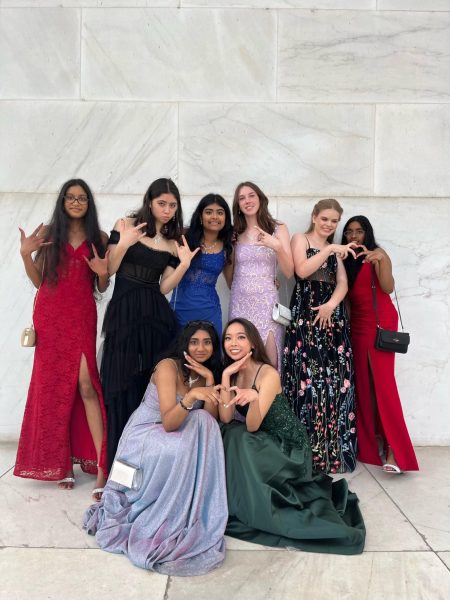Skinny shaming: a real woman
February 26, 2015
“You are so skinny.”
The tone with which people say this completely changes the meaning of the phrase. At one point it was said with praise, even envy– but now, without question, “you are so skinny” is said to us and many other girls with disgust.
Body image has, is, and will always be a common struggle for teen girls. The ideal body image is constantly changing. According to The Huffington Post, in times such as the Italian Renaissance and the Golden Age of Hollywood, it was ideal to have a fuller figure. However, over time, the ideal body type has changed to be arguably stick-thin. Today many agree that the preferred body type is a healthy, even a “thicker” body shape; not too thin, not too fat. Just as society heavily criticized people that were overweight after the ideal body image shifted to be slim, society has now begun to heavily criticize those who are thin.
We both always been considered thin in comparison to other girls in our grade, making us the target for endless comments about our weight and body type. Even family members will make remarks suggesting that we don’t eat food when in fact, we do, just like any other normal human being. Contrary to popular belief, “just eating a cheeseburger” doesn’t really help and neither does other synonymous comments. Doctors have assumed that we had anorexia or some other eating disorder and laughed about it. Friends have made similar remarks, prodding us on the side and asking “Why are you so skinny?” or even laughing and asking “do you even eat?” Some may argue that they’re just looking out for us, but there are many other ways to approach someone about her eating habits. Making jokes about someone’s weight is not going to help his or her self image at all.
This skinny shaming culture is beginning to become a more integral part of society, but many are brushing it off because of the extreme fat shaming that already exists. Whenever someone tries to argue that skinny shaming is a real issue, they’re faced with scrutiny. “Skinny girls have nothing to worry about. Fat shaming is so much worse.” Thinner girls are often told that they should just be happy with their body- “plenty of people would kill to have it.” These are all common arguments made by the opposing side. The reality about this attitude is that it’s rude, it’s insulting, it’s bullying and above all, it is not okay. Weight is an issue for many people, and many assume that skinnier girls have it easy and aren’t targets for any ridicule; that couldn’t be further from the truth.
Today’s society is focused on body positivity, the movement that says “all” body types are beautiful and that every girl has natural beauty. Although this idea can and does help improve the self-esteem of many girls, in some areas, it falls short. In the midst of championing larger body types, thinner body types are put down.
There are countless images that send the message that “real women have curves!” Are thin girls really not “real women?” By saying that real women have curvier, larger bodies, implies that skinny women don’t count, that if you’re thin, your body type is an unrealistic standard for “normal” women and that no one will appreciate it. This attitude can be detrimental to the self-esteem and body image of many women, especially teenage girls.
This brings about the issue of skinny shaming: the putting down of women who are thinner for the purpose of celebrating larger body types. Many people don’t realize what they’re doing when they make snide comments directed at thinner girls. I can’t even begin to count the number of times that someone has looked me up and down and asked “Why are you so skinny?”, as if it were an insult. And it has definitely started to feel like one. Even after years of ridicule for my body, I have finally come to terms with it. I’m happy and healthy, so who should care what that looks like?
This issue is overlooked by many because it seems to be less prevalent than “fat shaming.” Both issues are relevant and important since they both perpetuate body standards that no one can comply with. Putting down one body type for the sake of another isn’t improving society in any regard.
This shaming is everywhere, even within our school. While we were talking to one girl about an interview for this topic, a student sitting next to her remarked, “They’re talking about skinny shaming? What do skinny people even have to worry about?”, which only further proves our point. Everyone experiences moments of self-consciousness, no matter what they look like. Just because someone has the body that you perceive as ideal doesn’t mean that they have a body they like.
On the contrary, there are plenty of thinner girls who are very confident and proud of their bodies, but face ridicule because people see them as having an unrealistic and fake look. Take the Victoria’s Secret models, for example; as with all models, they work hard to keep their body proportions the way that their company wants them to. Their slim bodies face extreme scrutiny, especially during the annual Victoria’s Secret Fashion Show this past year . During this past year’s show, social media was filled with comments that implied that since these models conform to what some see as unrealistic body standards, they aren’t real women.
Many also “skinny shame” by poking fun at eating disorders. Eating disorders are serious mental health conditions that are very harmful to the person and everyone else involved. Skinny is not a synonym for anorexic; and, no, calling someone anorexic just because they’re skinnier than what many think healthy looks like is not okay.
Skinny and fat shaming are both big issues that many teenagers inevitably face. Neither is more important than the other, but skinny shaming is often overlooked.
Many overweight individuals still face unforgivable bullying and “fat shaming”, but society as a whole has become informed enough about the problem that if someone teases an overweight person online, thousands often rush to their defense. Sadly, the same is not true for thin people. If a skinny girl is made fun of, it’s very unlikely that anyone will rush to her defense or remind her that she is beautiful in the same way that they would for someone who is overweight. Social media tends to even poke more fun at thin girls instead of defending them, justifying this by saying that “skinny girls have no reason to be unhappy.”
Many popular songs and singers promote skinny shaming as well. We’ve all heard Meghan Trainor’s song “All About That Bass.” Although catchy, it holds an unfortunate message for thinner girls. The whole song portrays the message that you’re beautiful because you’re bigger and puts down women with thinner figures. Additionally, in an interview with Entertainment Tonight, Meghan Trainor said she “wasn’t strong enough” to maintain an eating disorder and “tried to be anorexic for a good 3 hours” then “quit” and ate, like a normal person. This is incredibly insulting since it romanticizes eating disorders, when they are in fact a serious issue, and suggests that it’s okay to make fun of eating disorders in this way.
Companies promote the idea of skinny shaming as well. Recently, Urban Outfitters was ordered to remove an image of a model with a “scary-skinny thigh gap” from their website. There are so many things wrong with this scenario. Calling a woman’s thigh gap “scary skinny” is unacceptable. That is her body, and no one has the right to insult that. This encourages people to use this same negative connotation and attitude with other girls with similar bodies. Switch this situation around. Would Urban Outfitters, or any major clothing store, be ordered to remove an image of “scary fat” legs? Absolutely not. To me, it seems insulting that they felt the need to remove this because of a thinner model when this would probably never happen if the situation involved a plus-size model.
Society won’t be able to move on from skinny and fat shaming until it learns to appreciate all body types. Love yourself, and love others. Every living, breathing person is a REAL person, no matter what their body looks like. Teach girls that they’re beautiful no matter what, so that they too can feel comfortable with the body they have.











